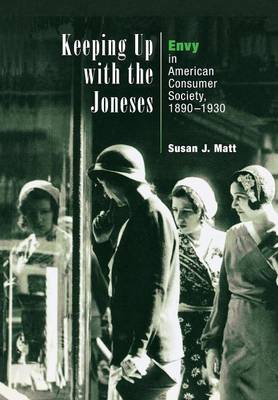
Stock image for illustration purposes only - book cover, edition or condition may vary.
Keeping Up with the Joneses: Envy in American Consumer Society, 1890-1930
Susan J. Matt
€ 69.78
FREE Delivery in Ireland
Description for Keeping Up with the Joneses: Envy in American Consumer Society, 1890-1930
Hardback. Examines a key transition in the meaning of envy for the American middle class. This book traces how attitudes about envy changed as department stores, magazines, movies, and advertising became prevalent, and the mass production of imitation luxury goods offered middle- and working-class individuals the opportunity to emulate upper-class life. Num Pages: 232 pages, 10 illus. BIC Classification: 1KBB; GT; HBTB. Category: (U) Tertiary Education (US: College). Dimension: 229 x 152 x 17. Weight in Grams: 520.
A century ago many Americans condemned envy as a destructive emotion and a sin. Today few Americans expect criticism when they express envy, and some commentators maintain that the emotion drives the economy. This shift in attitude is Susan Matt's central concern. Keeping up with the Joneses: Envy in American Consumer Society, 1890-1930 examines a key transition in the meaning of envy for the American middle class. Although people certainly have experienced envy throughout history, the expansion of the consumer economy at the turn of the twentieth century dramatically reshaped the social role of the emotion. Matt looks at how different groups within the middle class-men in white-collar jobs, bourgeois women, farm families, and children-responded to the transformation in social and cultural life. Keeping Up with the Joneses traces how attitudes about envy changed as department stores, mail-order catalogs, magazines, movies, and advertising became more prevalent, and the mass production of imitation luxury goods offered middle- and working-class individuals the opportunity to emulate upper-class life. Between 1890 and 1910 moralists sought to tame envy and emulation in order to uphold a moral economy and preserve social order. They criticized the liberal-capitalist preoccupation with personal striving and advancement and praised the virtue of contentment. They admonished the bourgeoisie to be satisfied with their circumstances and cease yearning for their neighbors' possessions. After 1910 more secular commentators gained ground, repudiating the doctrine of contentment and rejecting the notion that there were divinely ordained limits on what each class should possess. They encouraged everyone to pursue the objects of desire. Envy was no longer a sin, but a valuable economic stimulant. The expansion of consumer economy fostered such institutions as department stores and advertising firms, but it also depended on a transformation in attitudes and emotional codes. Matt explores the ways gender, geography, and age shaped this transformation. Bridging the history of emotions and the history of consumerism, she uncovers the connection between changing social norms and the growth of the consumer economy.
Product Details
Publisher
University of Pennsylvania Press
Format
Hardback
Publication date
2002
Condition
New
Weight
519g
Number of Pages
232
Place of Publication
Pennsylvania, United States
ISBN
9780812236866
SKU
V9780812236866
Shipping Time
Usually ships in 15 to 20 working days
Ref
99-15
About Susan J. Matt
Susan J. Matt teaches history at Weber State University.
Reviews for Keeping Up with the Joneses: Envy in American Consumer Society, 1890-1930
In this lively short book, Susan J. Matt surveys the legitimization of consumer desire that paralleled the demise of Victorian culture and the rise of modern culture from 1890 to 1930. -Journal of American History How the Tenth Commandment (that's the one about coveting) became extinct is a tale of how the emotional style of this country mutated within the golden years of the nascent consumer economy, which Susan J. Matt . . . defines as the period between 1890 and 1930. She explains that we couldn't be a nation of consumers until we were given public license to envy. -New York Times Drawing on memoirs, magazine articles, and sociological studies as well as reading between the lines of advertising copy, Matt gracefully evokes the pathos of consumerism in its formative years. . . . In highlighting the significance of envy as both the raw mental material and the ultimate product of consumer capitalism, this boldly argued book creatively extends the history of emotions. -American Historical Review
